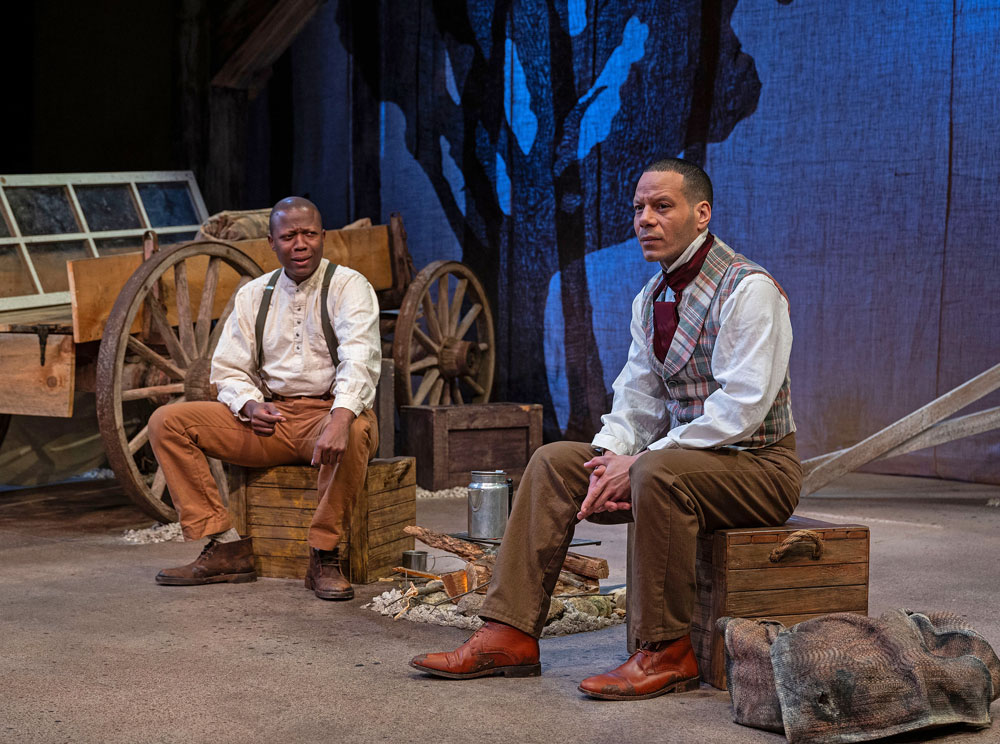
Some say that in any family with two or more children, each child has a different set of parents. The relationship one child has with either of them is never exactly the same as it is for another brother or sister. The ramifications of those relationships and the way they’re entangled with history, race, legacy and power lie at the heart of The Reclamation of Madison Hemings.
Presenting “new and classic American stories” sits at the core of American Blues Theater’s mission and this effort, in their wonderful new home, couldn’t be more absorbing. The time is at the end of devastating tumult, the Civil War, and Israel Gillette Jefferson (Manny Buckley) is returning to his place of origin in Virginia to reunite with his brother, Moses. A former slave now resettled in Ohio, he’s accompanied by his friend, Madison Hemings (Jon Hudson Odom). Their differences are immediately noticeable. Israel’s measured, deliberate, reflective. He dresses modestly, and even though his words are simple and direct, when he speaks they often ring with natural profundity. Much more spontaneous, matter of fact and when he chooses, irreverent, Madison has a patrician air about him. One that goes beyond his long coat and tailored vest. He wears a confidence that suggests both defiance and will. Despite their dissimilarities, it’s clear they share a deep bond forged by their shared experience on this land very near Monticello.

Monticello is where Israel was enslaved. It’s also where Madison, now also relocated to Ohio, lived with his mother, Sally Hemings and his father, Thomas Jefferson. Their return stirs harshly disquieting memories that, as we hear them being recalled, expand our understanding of people living in a brutally bifurcated society. Most Americans are aware of and accept the reality of the corporeal heinousness of slavery. In The Reclamation of Madison Hemings, it’s the psychological cost that comes to the fore. As centered spiritually as he is philosophically, Israel’s recollections are tinged with stoicism and Buckley’s splendid portrayal of him endows Israel with remarkable forbearance and dignity.
Fire defines Madison. When he bitterly describes how as a child he could be standing right next to his father and neither be acknowledged or recognized, the depth of his pain still rang fresh and deep. Now, years later with both of his parents dead, when he denounces his father as a hypocrite his words are drenched in the heat of anger.
In the 18th century, how open a secret was Jefferson’s relationship with Madison’s mother isn’t clear. That in 1785, at the age of 45, he took a 14-year-old female slave to Paris as a companion to his daughter is incontestable. He would make her, in Madison’s words, his “concubine” and she would bear him “seven children over a thirty-eight-year liaison”. DNA has subsequently provided its scientific substantiation.

Although their lineage made them a “caste apart”, our third President’s Black children were still slaves with no rights and without freedom. Jefferson had no male heirs from his wife, Martha Wayles. Heavily in debt at his death, Monticello’s assets were sold off; including his approximately 100 slaves. Israel and Madison’s remembrance of those agonizing days made up some of the most moving moments of the play. Not only are the loss and regret incomprehensible as it seeps from their voices, neither is the scale of callousness required to cause so much psychological devastation. Their recounting of that experience and its decimation brought into focus a chief desire of playwright, Charles Smith. It became a vehicle to acknowledge the countless enslaved individuals lost to obscurity who not only tilled the land, but dug the canals and built the infrastructure that made the South thrive.
Madison details how both a brother and a sister, choosing to escape the weight of such trauma, left Monticello and re-entered the world as white. He didn’t share that desire. Knowing that, as Thomas Jefferson’s son Monticello should be his; he finds his own way to claim it. That decision transforms The Reclamation of Madison Hemings into a study on the many facets of authentic friendship and a treatise on how much sway the past holds on our lives in the present. It’s that connectivity that Smith accentuates and honors in this story about confronting and rectifying bygone ills.
As playwright and director respectively, Charles Smith and Chuck Smith have often worked together. Their collaboration here seems particularly fruitful. Both deans of their crafts, they make this project sing with the wonder of music. And thanks to the considerable prowess of two marvelous actors in Buckley and Odom, Israel G. Jefferson and J. Madison Hemings are transformed into unforgettable icons of American history.
The Reclamation of Madison Hemings
Through March 24, 2024
American Blues Theater
5627 N. Lincoln Avenue
Chicago, IL 60659